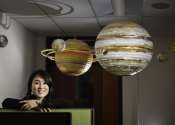Discovery changes understanding of water's history on the moon
New research from a Western University postdoctoral fellow shows the early lunar crust, which makes up the surface of the moon, was considerably enriched in water more than 4 billion years ago, counter to previously held ...









